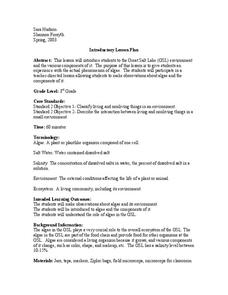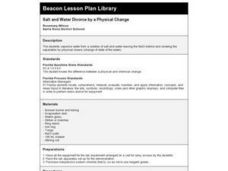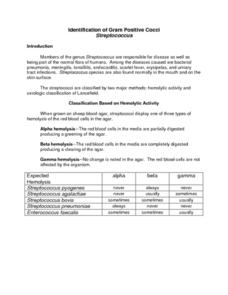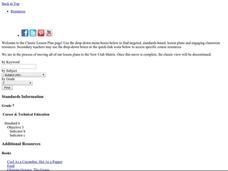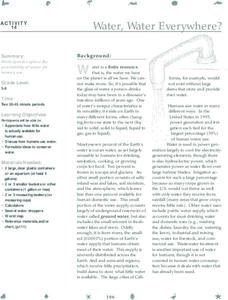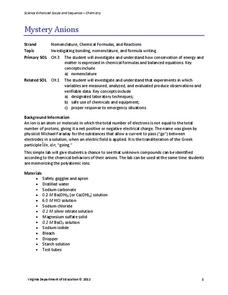Curated OER
Locating the Salt Front
Learners use Hudson River salinity data to create a line
graph that shows the location of the salt front, and use math
skills to explore how this location varies over time. They use the graph to estimate the location of the salt front...
Curated OER
Finding the Salt Front
Pupils discuss definitions of estuary, salinity, and the salt front. They listen as the teacher explains the Hudson River Miles and ways the upriver and downriver sections relate to the north and south. Students graph the salt front...
Curated OER
Understanding the Effects of Salt on Ice
Middle schoolers explore the concept of freezing point in an experiment that shows why salt is effective at clearing ice from roadways in the winter. In small groups, they compare the process of making homemade ice cream in plastic bags...
Curated OER
Acids, Alkalis, and Salts
In this acids worksheet, students review the definition of acids, bases, and salts. Students describe the differences between acids and alkalis and define neutralization. This worksheet has 2 short answer and 1 problem to solve.
Curated OER
Great Salt Lake
Third graders are introduced to the Great Salt Lake (GSL) environment and the various components of it. They make observations about algae and its environment and discuss why it is considered a living organism and various components of...
Curated OER
Salt and Water Divorce by a Physical Change
Students discuss the definitions of physical and chemical properties and changes. They vaporize a solution of salt and water, observing the sodium chloride that is left behind.
Curated OER
Salt Lake City Ordinances from the 1860s To Get Students Involved
Fourth graders examine a variety of 1860 ordinances from Salt Lake City. As a class, they listen to a local governmental official discuss the ordinances in effect today. In groups, they compare and contrast the ordinances from the two...
Curated OER
Actively Organizing Passive Resistance
Students explore organizing to resist oppressive authority without the use of violence. In this philosophy lesson, students research Gandhi's approach to organizing people around a positive cause without the need to be aggressive or...
Curated OER
Salt Solution
For this mixtures worksheet, students answer three essay questions about the amount of salt in a solution. They tell how long a 500 gallon tank will take to empty when given the rate that the water is leaking out. They write about the...
CK-12 Foundation
Don't Slip
Salt is the go-to material when people need to melt ice—learn the chemistry behind its effectiveness with an interactive lesson. Pupils watch a short narrative and then explore the concept through a simulation. Young scientists...
University of Waikato
Temperature, Salinity and Water Density
The difference between sinking and floating may be a little salt. Young experimenters analyze the effect of salt and temperature on the density of water. They use their results to predict the effect of climate change on ocean ecosystems.
Curated OER
DNA Extraction from Yeast Cells
Students explore DNA. They work in groups and mix prepared detergent/ salt solution, meat tenderizer solution, Fleischman's yeast and water to extract DNA from yeast. Observations are recorded.
Curated OER
Identification of Positive Streptococci
After being introduced to the genus Straptococcus, biology buffs set up agar plates, esculin slants, and salt broth tubes with different species to test. The level of laboratory skills required to perform this activity makes it most...
Pingry School
Effect of Solutes on Boiling Point
Anyone that lives around snow knows that adding salts to water increases its melting point. Are there solutes that affect the boiling point as well? A scientific experiment has learners add different solutes to water and then monitor the...
Teach Engineering
Properties of Mixtures vs. Solutions: Mix It Up!
Now it becomes crystal clear why the unit is called Mixtures and Solutions. The fifth installment of a six-part unit explores mixtures and solutions. After viewing a demonstration on mixing pebbles with water, salt with water, and...
Curated OER
The Quicker the Better? Food Processing
Kids explore food choices, nutrition, and agriculture through a variety of sources and activities. They research unknown words on food labels, test the salt content in canned vs non-canned foods, and discuss processed foods. The lesson...
Curated OER
So Much Water, So Little to Drink
Students explore salt and fresh water. In this water lesson, students investigate the amount of Earth covered by water. Students compare the amounts of salt water to fresh water. Students create a visual representation to aid comprehension.
US Geological Survey
Water, Water, Everywhere?
Less than one percent of the earth's water is available for human use. A hands-on activity models the phenomenon for young scientists. Beginning with a specific volume of water, learners remove water that correlates to the percent of...
Curated OER
The Care and Feeding of Kids: Finding Information on Nutrition and Fitness
The Learning Network is featuring an article about First Lady Michelle Obama and her quest to help reduce childhood obesity in America. The article talks about how she has talked with the top three suppliers of school lunches and has...
Curated OER
How Soluble Is It?
Is sugar more soluble than salt? Experiment with water and solubility with an elementary science activity. After interpreting data from a bar chart, fifth graders use different types of sugar to determine if the size of sugar particles...
Sea World
Arctic Animals
Discover the coldest animals in the world with a lesson about the Arctic habitat. Kids use a glossary and information sheet about animals found in the Arctic Circle to complete several activities, including tracking the lemming...
Mr. Hill's Science Website
Density Workbook
It's all about density! Here's a dense workbook for young scientists; they solve (and show work for) 29 density word problems, including a problem where they solve for the density of Godzilla. They complete labs analyzing metal cubes,...
Virginia Department of Education
Mystery Anions
Lost an electron? You should keep an ion them. Young chemists learn qualitative analysis in the second activity of an 11-part chemistry series. After observing reactions of simple salts, the teacher provides pupils with unknown samples...
Teach Engineering
Cell Membrane Experimental Design
Grandma said to gargle with salt water for a sore throat. Was she right? In the last part of the seven-part unit, lab groups design an experiment to test a cells reaction to salt solutions. The pupils conduct their experiment to answer...
Other popular searches
- Salt Dough Map
- Salt Water
- Salt Marshes
- Salty Oceans
- Gold and Salt Trade
- Great Salt Lake
- Epsom Salt
- Salt Water Chemistry
- Fresh Water Salt Water
- Mahatma Gandhi Salt March
- Growing Salt Crystals
- Freshwater and Saltwater






